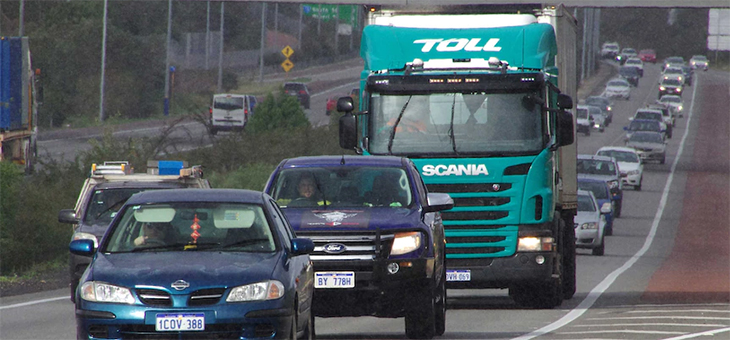Around 7000 truck drivers employed by one of Australia’s largest transport firms are on strike across the country today, and that could mean disruptions and shortages of food and fuel supplies for some consumers.
Why are they are on strike?
The drivers are members of the Transport Workers’ Union (TWU) and they are negotiating over their new enterprise bargaining agreement, which determines pay and conditions.
Toll is offering a 2 per cent pay rise for the next two years and a $1000 sign-on bonus after the workers agreed to forgo a pay rise last year because of the coronavirus pandemic.
But the TWU, which is negotiating on behalf of the workers, is calling for a 3 per cent pay rise and job security.
Negotiations broke down because Toll wants to cut overtime for permanent staff and use short-term contractors and workers from labour hire firms on lower wages.
The truck drivers are worried about their future in an industry which the TWU says is already pushed to the brink in terms of safety and conditions.
Toll agreed in the previous enterprise agreement to employ transport workers full time “wherever possible” and to promote job security “through the full utilisation” of full-time permanent transport workers and owner-drivers before part-time and casual staff.
The union said drivers depend on overtime to make their job “viable”.
Under the Road Transport and Distribution Award, a junior transport worker earns $21.53 an hour while a senior worker earns $27.53 an hour.
With overtime on Sunday those rates nearly double to $43.06 and $50.72 an hour, and they rise again on public holidays.
Ninety-four per cent of union members voted to take industrial action in an official ballot overseen by the Fair Work Commission, which means they were legally allowed to go on strike.
What does Toll say?
Toll is one of Australia’s largest transport companies and it has customers across a range of industries from retail and beverages to hospitals, chemicals, agribusiness and mining.
Its customers include supermarket giants Coles and Woolworths, food manufacturer Mondelez and fast-food chain McDonald’s.
Toll Global Express president Alan Beacham said this week that the TWU was playing politics by threatening industrial action in the middle of a global pandemic.
“As one of the country’s biggest transport companies, we are well used to managing disruptions to our operations, from bushfires to floods to a global pandemic,” he said.
“We can assure customers their goods will be transported during any potential industrial action.”
That means Toll has contingency plans in place to use drivers who are not union members and subcontractors to make deliveries today.
Toll said the strike could disrupt the delivery of medicines including COVID-19 vaccines, but the TWU said it would “ensure” the strike did not delay vaccines or medical supplies.
What do Toll’s customers say?
Toll’s customers are still expecting deliveries to be made because of the company’s contingency plans to use non-union labour.
However, they said there could be some shortages of products because there would be fewer deliveries due to the strike.
Retailers are already under the pump because of the COVID lockdowns and restrictions, and because global supply chains were being squeezed by huge demand for products as economies rebound from the pandemic.
National Retail Association chief executive Dominique Lamb said the strike by delivery drivers was bad news for retailers at a challenging time.
“Strict border restrictions and the COVID pandemic already has the nation’s supply chain under immense strain,” she said.
“The last thing we need is industrial action at a time when many small businesses are hanging by a thread.”
Supermarkets are also facing a shortage of workers because of the spread of the virus and the need for infected or potentially exposed staff to isolate.
Could there be more strikes?
More strikes by truck drivers could be on the table as enterprise bargaining negotiations continue across the transport industry.
The Transport Workers Union says up to 15,000 drivers in total could go on strike during the EBA negotiations with the five big transport firms as the industry pushes down wages by using cheaper contractors.
This figure includes the Toll drivers.
Two thousand workers in the food and alcohol supply chains serviced by Linfox and Bevchain applied to the Fair Work Commission this week to hold votes on taking protected industrial action.
Another 6000 transport workers are voting on industrial action at StarTrack and FedEx.
The union said the transport companies are trying to cut costs by cutting wages and conditions.
TWU national secretary Michael Kaine said drivers were under a lot of pressure to meet delivery deadlines while also having to deal with COVID restrictions.
“The agreement proposed by Toll will lower standards in an industry already in crisis,” he said.
“Drivers know all too well what happens when conditions and pay are dragged down in transport: stressed, chronically fatigued drivers are forced to work long hours, speed and skip rest breaks resulting in deaths and injuries on our roads.
“We should be lifting standards in Australia’s deadliest industry, not pulling them down.”
He wants to see the reintroduction of an independent road safety tribunal to better protect workers in the trucking industry.
 © 2020 Australian Broadcasting Corporation. All rights reserved.
© 2020 Australian Broadcasting Corporation. All rights reserved.
ABC Content Disclaimer

